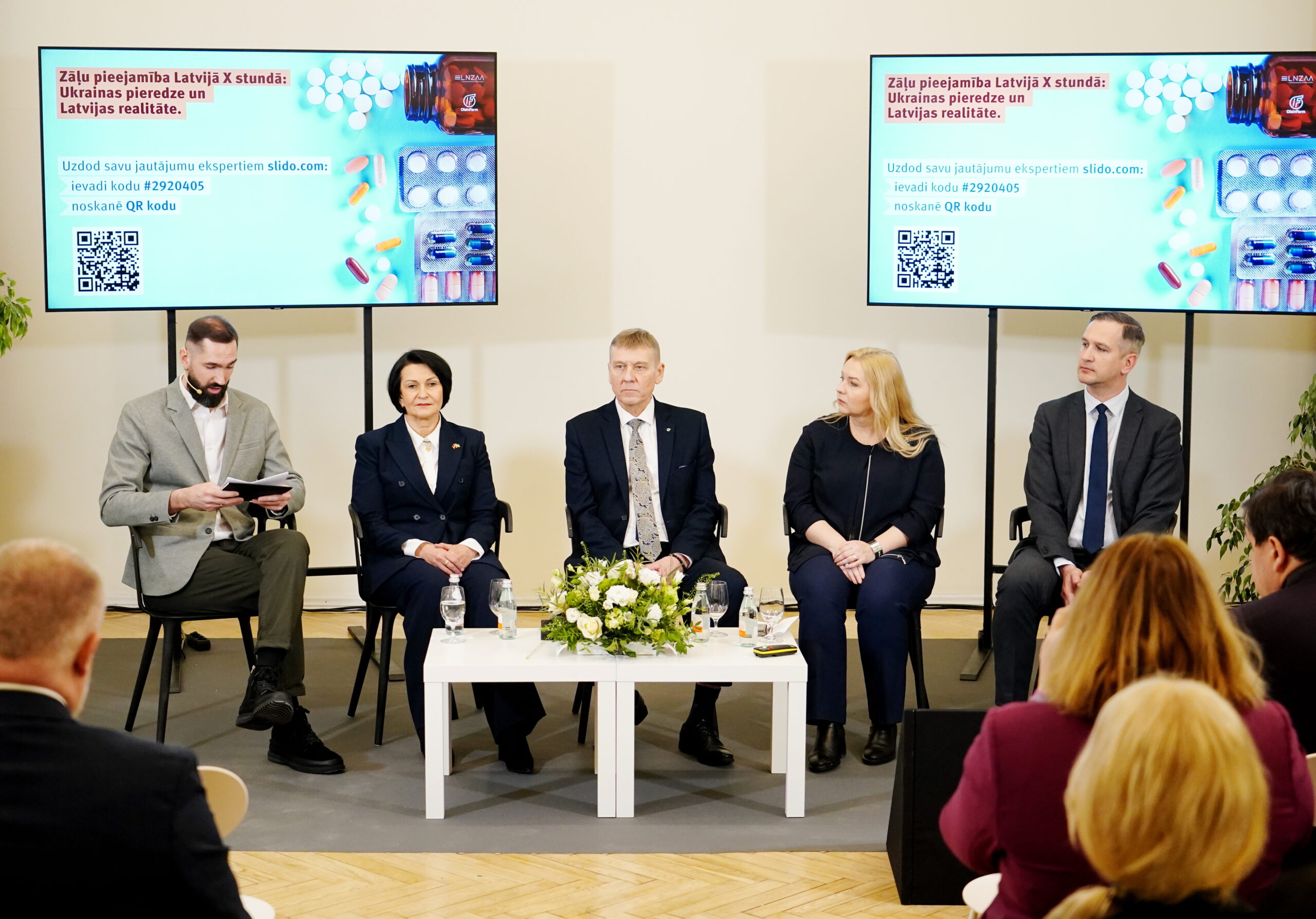The pandemic and the subsequent war in Ukraine clearly showed how vulnerable the international drug supply chains are, and how critical the consequences can be in countries like Latvia, where drugs from foreign manufacturers are strongly dominant. On Tuesday, 13 February, during the discussion “Availability of Medicines in Latvia at X Hour: the Ukrainian Experience and the Latvian Reality”, health care and security industry experts concluded that, unfortunately, the country is currently not prepared to ensure the availability of medicines to all patients in crisis situations. A crisis can be, for example, of a military nature, a recurrence of a pandemic, the diversion of the volumes of foreign manufacturers elsewhere, to larger or their home markets, or other unforeseen circumstances. In order to prevent possible problems with the availability of medicines, the Ministry of Health, in cooperation with other responsible institutions and non-governmental partners, should immediately commence the work on the creation of a national reserve fund for medicines.
The seriousness of the situation is also confirmed by the survey* conducted among Latvian health care specialists and pharmacists, which shows that only 9% of those working in the industry have had access to all the medications needed for their work over the past four years. Interruptions in international supplies and supply quotas set by foreign manufacturers are cited as the most common reasons for the unavailability of medicines. Only 11% of the surveyed specialists believe that the country is prepared for the supply of medicines to citizens in emergency situations, besides, only 13% feel sufficiently informed about how the supply and distribution of medicines to patients in such situations would be ensured.
However, 84% of doctors and pharmacists believe that Latvia should create a national medicine reserve fund. Oksana Sičko, a neurologist and head of the Ukrainian support society “SICH”, also pointed out on the need for this during the discussion.
“I recommend Latvia to learn from Ukraine’s mistakes and to prepare for crisis situations in times of peace! When the war started, the country had almost no reserves of medicinal products, and the situation was made even worse by the fact that the entire world had been living in the shadow of a pandemic for several years before that. Latvia needs to create not only emergency medicine stocks, but also medicine for chronic patients who cannot stop their therapy, such as diabetes and cancer patients. Besides, Latvia is in a very advantageous situation, because historically there is a strong pharmaceutical industry here. For example, Olainfarm is already expanding its product portfolio, and the state needs to find how local production can be further supported in order to ensure that Latvian patients are provided with medicine for at least 3-6 months in the event of any emergency,” emphasizes O. Sičko.
The seriousness of the situation in the field of medication supply is also brought up by the European Union (EU). At the end of 2023, the European Commission and the European Medicines Agency have approved the EU’s list of critically important medicines, the continuity of supplies of which is a priority of the EU. On the other hand, the previously published report of the European Commission covers a series of solutions and proposals to ensure the continuity of availability of medicines at the highest possible level. The solutions provide for the evaluation of both regulation, supply and procurement issues, and also call on the member states to strengthen the pharmaceutical industry in the EU and also to assess the formation of national stocks.
“Latvia currently has established an effective and operating system for the supply of medicines for daily needs, however, unfortunately we are not ready for crises at the national level. The Covid-19 pandemic already proved that the country is not ready to deal with these issues professionally and promptly. It fully relied on the social responsibility of market participants, but it purchased vaccines late and, as it turned out, in an unreasonable amount. However, we see more and more clearly that there must be a solution and we must start working on it in a timely manner. About 94% of medicines in the Latvian medicines market are imported from other countries. Therefore, we are very dependent on international supplies, and we have experienced their interruptions several times in recent years. At the time when 42.9% of inhabitants of our country has chronic diseases, staying without the necessary medicines would not only significantly worsen their health condition, but also increase spending for both the inhabitants themselves as well as the country as a whole,” says Jānis Lībķens, Head of LNZAA (Latvian National Medicines Supply Association), stating that with the existing regulation and system, medicine supply companies usually do not build stocks for longer than a month, because otherwise disproportionate financial risks may arise.
On the other hand, Elīna Egle-Ločmele, the Chairman of the Board of the Federation of Latvian Security and Defense Industries, pointed out that the creation of a national medicine reserve fund is very important for national security.
“In emergency situations, such as war, natural disasters or other threats, the fast and efficient supply of medicines becomes vital, as it not only ensures the need of inhabitants for medicines, but also strengthens the overall security and protection level of the country. A clear system, responsibilities, awareness and preparation of those involved are crucial so that, in emergency conditions, as much resources as possible can be devoted to the management of the specific crisis, instead of trying to solve issues that could have been prepared in advance. In business we call it business continuity, but at the national level – the sustainability of society,” E. Egle-Ločmele is convinced.
